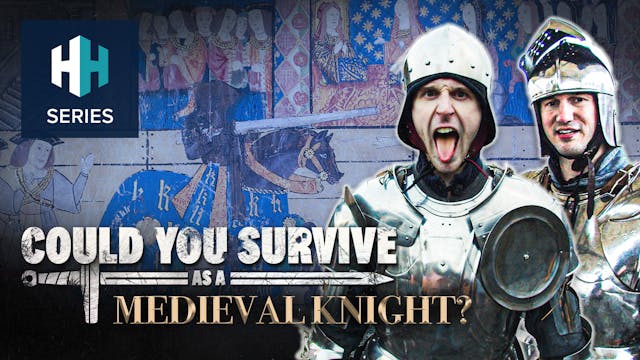In this video, History Hit duo Louee Dessent and Luke Tomes join the Swords of Penda re-enactment group - volunteers who bring the 7th century to life through painstaking research and experimental archaeology - to test their early medieval mettle. Louee fills the shoes of a Saxon Thane - a lord who held his land directly from the king in return for military service in time of war, while Luke discovers what life would have been like for a Churl, the free peasant who formed the basis of society in Anglo-Saxon England.
They explore various aspects of life in Anglo-Saxon England. Covering topics such as society, diet, hygiene, crafts and jewellery-making, cultural changes, medicine and music. The video discusses how the Anglo-Saxon period in England spanned six centuries and marked the arrival of Germanic speaking tribes that formed warlike kingdoms and pushed the native Britons further west. The video explores the different classes of society, from the king and his ealdormen to the thralls who could be bought and sold as property. While wealthier people enjoyed a better standard of living and had better weapons and armour, the risks of disease and infection were a great leveller. The video also discusses remedies and cures used in Anglo-Saxon England for illnesses and injuries, and the importance of music in everyday life. Finally, the video discusses Saxon funeral practices and ritual gatherings called "symbel" where toasts were made drinking mead from a cow's horn.
The Anglo-Saxon period in England spanned six centuries, beginning with the Roman withdrawal from Britain in 410, and ending with William the Conqueror’s victory at the Battle of Hastings in 1066. It was an era that used to be known as the Dark Ages, due to the lack of written sources and remaining physical traces. But more evidence is slowly coming to light.
At first, Germanic-speaking tribes like the Angles, Saxons, Jutes and Frisians began to arrive from the continent in small groups, but they would eventually form warlike kingdoms like East Anglia, Kent, Wessex and Mercia, pushing the native Britons further west. This violent phase of history was also a time of competing religions and cultures; new languages and a new hierarchical system were introduced by the invaders.
Life in Anglo-Saxon England was tough for everyone - famine and disease, not to mention your neighbours, were an ever-present danger, even for the rich and powerful. And it was even harder for those at the very bottom of society - who scratched a living from the land and served at the beck and call of their local lord.
They explore how your place in society would determine how you lived…and how you died… finding out if this really was one of the harshest periods in history. How advanced was Anglo-Saxon medicine? Were Saxon blood feuds real?
The question is, could you survive, as an Anglo-Saxon warrior? Watch this video and comment below! 👇
Up Next in Could You Survive?
-
Could You Survive as a Medieval Knight?
What was it like to be a knight in the middle ages? What were your roles and responsibilities? How dangerous were medieval tournaments?
History Hit's Luke Tomes and Louee Dessent are back at the medieval tiltyard outside the Royal Armouries Museum in Leeds for the medieval tournament challenge. ...
-
Could You Survive a Napoleonic Invasi...
Imagine, it’s the mid-1800s. Since the end of the Napoleonic Wars, peace between Britain and France had been secured for close to half a century. And yet, for the English, the threat of an imminent invasion across the channel never seemed too far-fetched.
That’s why thousands of ‘navvies’ and l...
-
Could You Survive the Duke of Welling...
During the Napoleonic Wars the British Army experienced a time of rapid change. At the beginning of the French Revolutionary Wars in 1793, the army was a small, awkwardly administered force of barely 40,000 men. By the end of the period, the numbers had vastly increased to over a quarter of a mil...




3 Comments